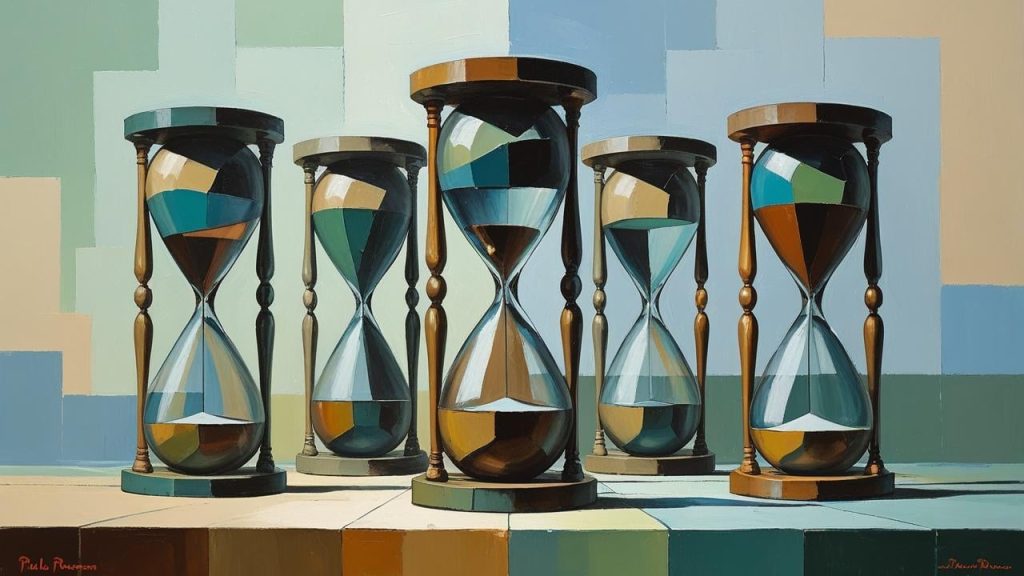Reading time: 7 minutes.

Hi Friend,
I’m glad you’re still reading these. I want to talk about two important things you need for this journey you’re on: time and patience.
If you’re anything like me, you might feel a sense of urgency that you need to just hurry up and figure everything out. You want clarity now, answers, and a sense of peace now! Sound familiar?
The discomfort of uncertainty can make us feel like we’re stranded in the middle of nowhere, longing to get somewhere—anywhere—with solid ground beneath our feet.
That manifested itself in so many ways for me. I would spend long nights studying new topics. I would pick up and read any book that someone recommended, And I’ve listened to podcasts, literally thousands of hours of podcasts.
No matter how much I studied and listened, it felt like I just wasn’t moving fast enough. I wasn’t learning enough.
But then, I learned something along the way: this process takes time. You can’t rush it!
Faith transitions don’t happen overnight. They unfold over months, years, and even decades. And they don’t follow a straight, predictable path. You might feel moments of certainty, only to find yourself questioning again. You can feel peace one day and anger the next. Some days you just want to run back to what you once knew, and other days, you might feel ready to leave it all behind.
That’s normal.
I think it’s pretty normal to be frustrated as well. Especially as a Latter-Day Saint.
We’ve lived with the idea of a strait and narrow path. We’ve been immersed in this concept of enduring to the end—like we are already on the right path, it’s all resolved, and now we just need to ride it out (which is not exactly what that means, but we’ve treated it that way.). Then, everything gets disrupted, and we just want to get back on that path. And that makes us impatient.
The faith models we discussed last time like Fowler’s Stages of Faith describe how people move through belief, doubt, and reconstruction. But they emphasize that we move in cycles, not in a straight line. You may revisit the same questions at different times, seeing them with fresh eyes as you continue to grow. There’s no right or wrong stage to be in.
This kind of searching has been part of the human experience for centuries. Many of the most faithful people in history wrestled with doubt for years—sometimes even for a lifetime.
That’s hard for our kind of people. We are used to checklists, to-do’s and being rewarded for doing things on time. Most of our goals have been time based: making it to Primary, then Young Men’s/Women’s, moving on the Relief Society or the Melchizedek priesthood, going on a mission, attending the temple, getting married, children, senior mission, etc. We have all been on timelines. We are the champions at on-time delivery.
But there’s no such thing here on the journey. There is no checklist. No 10-point plan.
We have so many examples of this, I am surprised it’s not obvious.
One of the most well-known descriptions of a long, difficult faith journey is The Dark Night of the Soul by St. John of the Cross. He describes a time of spiritual emptiness, where the presence of God feels distant or absent. It’s painful, disorienting, and lonely—but it’s also a crucial part of deep spiritual growth.
Mother Teresa, one of the most revered religious figures of our time, experienced this herself. Her private writings, later published in Come Be My Light, reveal that she felt spiritually lost for nearly 50 years! She described an aching absence where she once felt God’s closeness. And yet, she remained faithful, continuing her work even when she felt no reassurance.
If someone as devoted as Mother Teresa could struggle for decades, you can be gentle with yourself as you figure things out. It’s clear that God is not in a hurry to just pull us out of our faith journey.
Think about how long it took to build your beliefs in the first place. Years, maybe decades. They shaped how you saw the world, how you made decisions, how you found meaning. Changing or reshaping those beliefs is not something that happens quickly.
No one is waiting for you to “hurry up and get there.” Certainly not God, who let the Israelites wander for forty years.
I can only speculate why God doesn’t feel the need to pull us through this in a hurry. For me, as an imperfect parent, I don’t like to see my children go through difficult times. It pains me. But I also don’t want to shield my children from difficult experiences. As much as I want to help them, I know that if I did, they would miss out on some real growth.
And I think that’s why God is patient. He has time, because time is what we need.
I know that’s not reassuring when you are going through your own dark night of the soul.
Those emotions are hard, but they are also telling you something. Each, whether it’s grief, pain, relief, sadness, or excitement, is telling you what you need to hear. So, if you have time, stop and listen to what they are saying.
The poet Rainer Maria Rilke offers us this encouragement,
“Be patient toward all that is unsolved in your heart and try to love the questions themselves… Live the questions now. Perhaps you will gradually, without noticing it, live along some distant day into the answer.”
Can you feel the lack of urgency in that quote? Live the questions now…just let them sit with you. And gradually you’ll live along some distant day into the answer. That’s patience.
In contrast, when I hear the phrase “endure to the end,” I feel like it’s a call to just hold on, grit my teeth, and push through. To be honest, it has always sounded painful.
But now, I think about enduring differently—not as this long, tedious trek until I die. Instead, I think about enduring as not rushing toward a conclusion, but as making space for the process.
Enduring isn’t about racing toward certainty. It’s about giving yourself permission to take the time you need.
There’s no perfect timeline for faith, no final exam to pass, no finish line you need to cross by a certain date. You’re not behind. You’re exactly where you need to be.
Give yourself permission to be patient. Give yourself permission to set some things aside. You won’t solve your concerns all at once. And give yourself permission to keep asking questions.
Maybe asking questions is what Christ meant by becoming a little child. In the words Rachel Held Evans, “Those who say that having childlike faith means not asking questions haven’t met too many children.”[1]
I hope you’ll be patient with yourself. Keep going at your own pace. The road ahead isn’t about speed—it’s about learning to walk it well.
I’m here with you.
With warmth,
Your Friend
P.S. If you want to think further about this topic, here are a few options for you to read:
Letter to a Doubter, by Terryl Givens. A direct letter from the renowned LDS scholar (who now heads the BYU Maxwell Institute) to address doubts of LDS members.
The Dark Night of the Soul, by St. John of the Cross. A classic text that describes a period of deep spiritual struggle and transformation, emphasizing that this journey can take years but leads to deeper faith.
Come Be My Light, by Mother Teresa Mother Teresa’s private writings reveals her decades-long struggle with spiritual emptiness, offering reassurance that even the most faithful experience long periods of doubt.
[1] Rachel Held Evans, Evolving in Monkeytown
